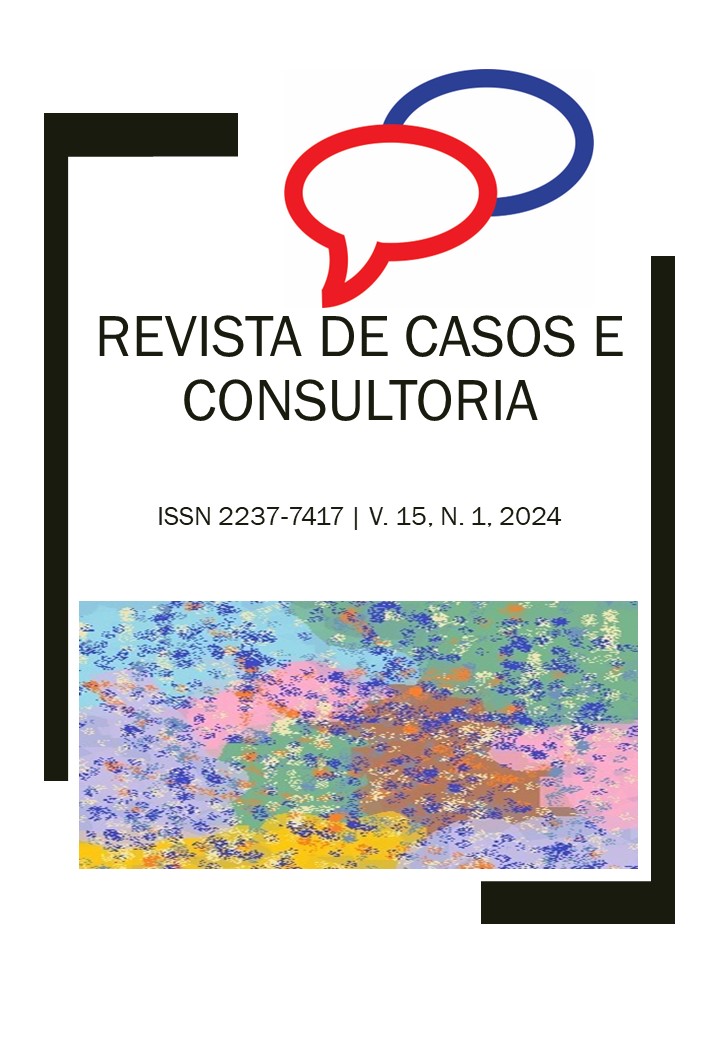A Character Study of Norman Bates From the Perspective of Cognitive Behavior Therapy
Keywords:
Cognitive behavioral therapy; childhood trauma; psychotherapy; serie.Abstract
The contribution of Cognitive Behavioral Therapy (CBT) provides the patient with the construction of adaptive thinking. As a psychological approach, it also helps the patient to identify how a traumatic episode can impact on global aspects of life, and how the patient must face a certain event resulting from a trauma. In view of the above, the aim was to carry out a theoretical-reflective study in relation to the character Norman from the Bates Motel series from the perspective of Cognitive - Behavioral Psychology. Therefore, this is a theoretical-reflective study, based on the Bates Motel series. The series was shown in the United States of America by A&E and premiered on March 18, 2013 and ended on April 24, 2017. In Brazil, the copyright was acquired by Netflix and was later renewed by streaming. from Globoplay. In total, the series is contemplated with five seasons with 50 episodes. In view of the analysis elaborated from the character's behavior and his family nucleus, it was verified that childhood trauma is the primordial factor for the evolution of dissociative identity disorder (DID). In conclusion, psychotherapy requires continuity, and in cases of post-traumatic situations it is essential that the patient seek help from psychologists and psychiatrists so that their psychological condition does not worsen. CBT is an approach that aims at the present, based on that, it establishes communication between therapist and patient so that there is a rescue of thoughts that can make it impossible and generate negative impacts on mental health. Interventions applied in CBT are based on tasks that the patient can perform in everyday life and that generate well-being and improvements for the complaints raised during psychotherapy.
Downloads
References
ALFORD, Brad A.; BECK, Aaron T.; JONES JR, John V. The integrative power of cognitive therapy. 1997.
AMERICAN PSYCHIATRIC ASSOCIATION, D. et al. Diagnostic and statistical manual of mental disorders: DSM-5. Washington, DC: American psychiatric association, 2013.
AMERICAN PSYCHIATRIC ASSOCIATION, A. P. et al. Diagnostic and statistical manual of mental disorders: DSM-IV. Washington, DC: American psychiatric association, 1994.
ARENDT, Hannah. A condição humana (11ª ed.). Rio de Janeiro: Forense Universitária. Tradução: Roberto Raposo, 2010.
BECK. Aaron T.; DAVIS, Denise D.; FREEMAN, Arthur. Terapia cognitiva dos transtornos da personalidade. Artmed Editora, 1995.
BECK, Aaron T. A 60-year evolution of cognitive theory and therapy. Perspectives on Psychological Science, 14(1), 16-20, 2019b.
BECK, Judith J. Terapia cognitivo-comportamental: teoria e prática/ Judith S. Beck; tradução: Sandra Maria Mallmann da Rosa; revisão técnica: Paulo Knapp.- 3. ed.- Porto Alegre : Artmed, 2022.
BECK, Aaron T; GRANT, Paul; INVERSO, Ellen; BRINEN, Aaron P; PERIVOLIOTIS, Dimitri. CT-R- Terapia cognitiva orientada para a recuperação de transtornos mentais desafiadores/ Aaron T. Beck…[et al.] ; tradução: Sandra Maria Mallmann da Rosa ; revisão técnica: Paulo Knapp, Elisabeth Meyer. - Porto Alegre:
Artmed, 2022.
BERNIER, Marie-Josée; HÉBERT, Martine; COLLIN-VÉZINA, Delphine. Dissociative Symptoms Over a Year in a Sample of a Sexually Abused Children. Journal of Trauma & Dissociation, 14(4): 455-472, 2013.
DA SILVA, Manoel Leonardo Tavares et al. Avaliação cognitiva de Montreal (MoCA) na pratica da Terapia ocupacional: Uma revisão integrativa. Revista de Casos e Consultoria, v. 12, n. 1, p. e27327-e27327, 2021.
DE CORRÊA, João Bosco Corrêa et al. Transtornos dissociativos em pacientes vítimas de abuso sexual na infância: Dissociative disorders in patients victims of child sexual abuse. Brazilian Journal of Development, v. 8, n. 7, p. 53876-53892, 2022.
FARIA, Marcello de Abreu. Transtorno dissociativo de identidade e esquizofrenia: uma investigação diagnóstica. 2016.
FIKE, M. Laurita. Clinical manifestations in persons with multiple personality disorder. The American Journal of Occupational Therapy, v. 44, n. 11, p. 984-990, 1990.
HÉBERT, Martine; LANGEVIN, Rachel; CHAREST, Florence. Disorganized Attachment and Emotion Dysregulation as Mediators of the Association Between Sexual Abuse and Dissociation in Preschoolers. Journal of Affective Disorders, 267: 220-228, 15 abr.202.
Kreyenbuhl, J., Nossel, I. R., & Dixon, L. B. Disengagement from mental health treatment among individuals with schizophrenia and strategies for facilitating connections to care: A review of the literature. Schizophrenia Bulletin, 35 (4), 696-703, 2009.
MAIA, Cláudio Silveira et al. Transtorno de Personalidade Histriônica: Diagnóstico e Terapêutica, 2019.
PEREIRA, Flávia Ribeiro et al. Transtorno Dissociativo de Identidade. In; ANAIS DO II CONGRESSO MÉDICO DE RIO VERDE, 2019, p. 203.
POSNER, Michael I.; RAICHLE, Marcus E. Imagens da mente. Porto: Porto Editora, 2001.
SALLES, Silvana. Cientistas descrevem circuito cerebral ligado ao estresse pós-traumático. Jornal da usp, 2018. Disponível em: <https://jornal.usp.br/tv-usp/cientistas-descrevem-circuito-cerebral-ligado-ao-estresse-pos-traumatico/> Acesso em: 16 Set. 2022.
SOUZA, José Carlos; GUIMARÃES, Liliana AM; BALLONE, Geraldo José. Psicopatologia e psiquiatria básicas. Vetor Editora, 2011.
STEINE, Iris M. et al. Cumulative Childhood Maltreatment and its Dose-Response Relation With Adult Symptomatology: Findings in a Sample of Adult Survivors of Sexual Abuse. Child Abuse & Neglect, 65: 99-111, 2017.
STERNBERG, Robert J. Psicologia Cognitiva. 4. ed. Porto Alegre: Artmed, 2008.
VAN DER HART, Onno. “The use of imagery in phase 1 treatment of clients with complex dissociative disorders.” European Journal of Psychotraumatology, 3.1 (2012): 8458.
YOUNG J, E. Cognitive Therapy for Personality Disorders: A Schema-Focused Approach. Sarasota, FL: Professional Resource Press, 1999.
Downloads
Published
How to Cite
Issue
Section
License
Copyright (c) 2024 Glaucyenne Cavalcante dos Santos, André Sousa Rocha

This work is licensed under a Creative Commons Attribution 4.0 International License.

 Português (Brasil)
Português (Brasil) English
English Español (España)
Español (España)